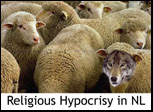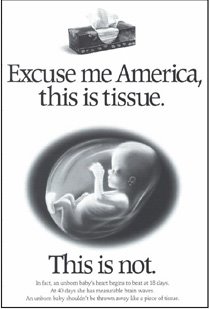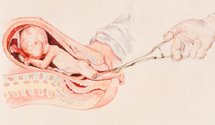
I have a question. Why did philosopher and Nobel Prize winner
Albert Camus note, about seventy years ago in his observations about capital punishment, that the Catholic Church "has always accepted the necessity of the death penalty?”
It seems very odd indeed to me that there is such clamour today for the abolition of the death penalty on a worldwide scale yet a virtual apathy and indifference, if not outright advocacy, by the same parties regarding the death penalty inflicted upon the Unborn.
What complicates the issue even more are the recent campaigns against capital punishment by the highest levels of religious leadership in the world, including most prominently by the late Pope John Paul II. There’s been great controversy over this trend, especially considering that the Catholic Church presents the view of unchanging and infallible truth in its teaching pronouncements over the centuries.
Dr. Albert Mohler has a blog entry from this week which addresses some aspects of this controversy. I find it intriguing.
**********
God, Moral Judgment, and the Death Penalty
In a fascinating new look at capital punishment, Professor Walter Berns of Georgetown University argues that support of the death penalty is tied to belief in God. He documents the link between secularization and declining support for capital punishment.
In "Religion and the Death Penalty," published in The Weekly Standard, Berns begins by observing that the best case for the death penalty "was made, paradoxically, by one of the most famous of its opponents, Albert Camus, the French novelist." Indeed, in opposing the death penalty Camus seems to have grasped what others had missed.
As Professor Berns explains:
The death penalty, he said, "can be legitimized only by a truth or a principle that is superior to man," or, as he then made clearer, it may rightly be imposed only by a religious society or community; specifically, one that believes in "eternal life." Only in such a place can it be said that the death sentence provides the guilty person with the opportunity (and reminds him of the reason) to make amends, thus to prepare himself for the final judgment which will be made in the world to come. For this reason, he said, the Catholic church "has always accepted the necessity of the death penalty." This may no longer be the case. And it may no longer be the case that death is, as Camus said it has always been, a religious penalty. But it can be said that the death penalty is more likely to be imposed by a religious people.
Further:
The reasons for this are not obvious. It may be that the religious know what evil is or, at least, that it is, and, unlike the irreligious, are not so ready to believe that evil can be explained, and thereby excused, by a history of child abuse or, say, a "post-traumatic stress disorder" or a "temporal lobe seizure." Or, again unlike the irreligious, and probably without having read so much as a word of his argument, they may be morally disposed (or better, predisposed) to agree with the philosopher Immanuel Kant--that greatest of the moralists--who said it was a "categorical imperative" that a convicted murderer "must die." Or perhaps the religious are simply quicker to anger and, while instructed to do otherwise, slower, even unwilling, to forgive. In a word, they are more likely to demand that justice be done. Whatever the reason, there is surely a connection between the death penalty and religious belief.
Berns then turns to consider the contrast between attitudes toward the death penalty in the United States and Europe. The contrasts are both obvious and instructive. Secular Europe is now on something of a global crusade against the death penalty. In the United States, high rates of church-going are matched to a high level of support for the death penalty.
As Berns explains, this has not escaped European attention. "European politicians and journalists recognize or acknowledge the connection, if only inadvertently, when they simultaneously despise us Americans for supporting the death penalty and ridicule us for going to church." Berns documents the depth of European secularity -- only about 4 percent of Germans attend church weekly, and in other major European nations the percentages are often even lower. In the end, Berns argues that Europe has lost a passion for punishment -- even respect for a structure of moral law.
He then offers a cogent observation:
A world so lacking in passion lacks the necessary components of punishment. Punishment has its origins in the demand for justice, and justice is demanded by angry, morally indignant men, men who are angry when someone else is robbed, raped, or murdered, men utterly unlike Camus's Meursault. This anger is an expression of their caring, and the just society needs citizens who care for each other, and for the community of which they are parts. One of the purposes of punishment, particularly capital punishment, is to recognize the legitimacy of that righteous anger and to satisfy and thereby to reward it. In this way, the death penalty, when duly or deliberately imposed, serves to strengthen the moral sentiments required by a self-governing community.
Professor Berns offers genuine insight and understanding in this argument. Indeed, I think his argument is even larger than the death penalty in its application. The absence of God -- and thus the absence of a transcendent standard of judgment and morality -- inevitably weakens all moral judgment. This certainly applies in the case of the death penalty, but it must also apply in other cases as well. When a transcendent standard of judgment and value disappears, the regime of therapy remains. Crime becomes anti-social behavior, wrong-doing becomes a syndrome, and moral judgment is endlessly hesitant and constantly renegotiated.
Secularism transforms a society. Professor Walter Berns understands that one of the apparent consequences of secularism is the difficulty of making hard moral judgments -- the kind of hard judgment needed for the most evil of crimes.
[Source]
[image source]
Labels: abortion commentary, Christian leadership, death penalty, secularism
 I'm working on a gallery of pro-life images to make available online. These images are published in a private collection on Flickr. If you would like to access them, please email me and I will send you an invitation to join the gallery group. Email me at this address:
I'm working on a gallery of pro-life images to make available online. These images are published in a private collection on Flickr. If you would like to access them, please email me and I will send you an invitation to join the gallery group. Email me at this address: 






























